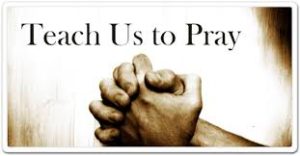
The three pillars of Lent are prayer, fasting, and almsgiving. By now if you’ve been reading my blog through the past few days you are probably tired of hearing that. It’s important to note though exactly what the Church is trying to tell us in her liturgies by asking which one is being focused on today. Now, when the daily readings focus on one, it does not mean that one is more important than the other. Like a three-legged stool, if you take away one of the legs, the stool is going to fall. If you elevate one higher than the other, it’s going to be wobbly and risk collapse or tipping over.
Today we see Jesus reminding us not to babble on and on as the “pagans” did. This is not Jesus telling us to never use rote prayers or to never repeat the same words. He himself prayed in repetition at times, and at one point “all night.” So the length of the prayers and the words being repeated were not the issues. The pagans would invoke long litanies of the names of their false gods in the belief that if they said it enough, invoked the right names, their god would be either forced into doing it or bribed into noticing them. That doesn’t fit well with Christian theology.
Speaking of Christian theology, the Lord’s prayer is like an ogre… I mean an onion. It is filled with many layers of meaning, so deep that volumes have been written on the meaning of each line. Notice that the first half deal with our relationship with God. The second set deal with our relationship with one another. They reveal to us how we are all family, brothers, and sisters. That we are all citizens of a kingdom where the King allows us to work with Him, and not just as slaves. That our forgiveness depends on our forgiving others.
They all seem to hinge on one line in the middle: “give us this day our daily bread.” The word there for daily could also be translated “supersubstantial” bread. The Eucharist. In order for us to begin to live out all of the depth of meaning in these words, God has given us Himself as bread to begin to transform our lives. That is why the Church calls the Eucharist “the source and summit of our faith.” It is also why the Liturgies of the Mass are the most important part of our prayer life.
If you are able, daily Mass during Lent is a powerful and meaningful way to grow in prayer. It is joining together with the entire Church through the world and throughout the ages to say “Our Father.” Then to receive that which nourishes us so substantially that it brings us from death to life, Jesus Christ Himself. We should also spend some time today reflecting on the Lord’s prayer, looking at each line carefully. The Catechism of the Catholic Church breaks it down for us in the section on Christian Prayer (2759-2865). The Church reminds us in there that the Lord’s Prayer “is truly the summary of the whole gospel.” If you want to dive deeper, that’s a powerful place to begin.
With that in mind I am going to leave you with a much more eloquent statement to ponder:
“Finally, if we pray the Our Father sincerely, we leave individualism behind, because the love that we receive frees us from it. The “our” at the beginning of the Lord’s Prayer, like the “us” of the last four petitions, excludes no one. If we are to say it truthfully, our divisions and oppositions have to be overcome” (2792)
This is what Lent is all about.
A reflection on the readings for Tuesday of the First Week of Lent, year 1: March 12, 2019
